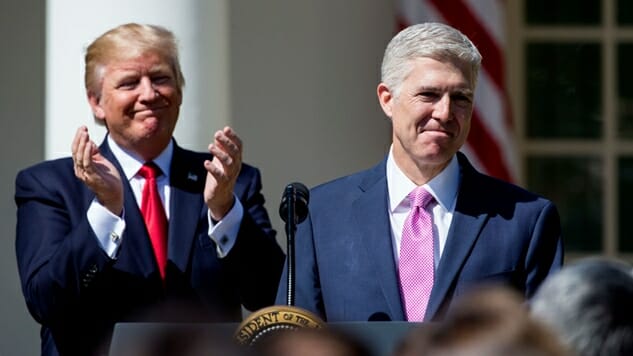The Supreme Court Just Dealt a Massive Blow to Unions
Photo by Eric Thayer/Getty
“Labor rights” are dirty words in modern America, and there is a direct line between our national plague of income inequality and the war by capital against labor unions.
— Best Posts (@onlygoodposts1) May 21, 2018
Yesterday, the Supreme Court delivered yet another victory to the doorstep of major capital at the expense of the rest of us. In a 5-4 ruling down partisan lines (read: Republicans made this the law), the highest court in the land enabled employers to force their workers to give up their ability to collectively sue in court, and instead shoehorn them into a one-on-one arbitration. This ruling is the same story as the war against labor rights: more for those who control capital, and less for everybody else. Ruth Bader Ginsburg touched on how radical a departure this is from traditional policy in her dissent that centered on the National Labor Relations Act.
As RBG notes in dissent, this decision tears a massive hole through post-New Deal labor law. It essentially substitutes the majority’s economic preferences for those made by Congress. We will be reeling from this decision for years and decades to come. pic.twitter.com/PH1hyKhcDX
— Mark Joseph Stern (@mjs_DC) May 21, 2018
The Supreme Court even acknowledged that their argument was based on a law that Congress could change at a whim (which is why ultimately, the onus lies on Congress to fix this mess).
In which the Supreme Court acknowledges that class action waivers—contracts that force employees into one-on-one arbitration—would be unenforceable if they conflicted w/ Congress’s protection of “workers’ concerted activities for the purpose of … mutual aid and protection.” pic.twitter.com/6au5Y0Gg2w
— southpaw (@nycsouthpaw) May 21, 2018
… but then finds no conflict. Remember this when you hear judicial nominees talk about balls and strikes or whatever.
— southpaw (@nycsouthpaw) May 21, 2018
Dave Jamieson, Huffington Post‘s labor reporter, explained why this is such a monumentally bad thing for us normal employed folk who don’t control huge sums of capital:
The Supreme Court ruling will have long-lasting implications for workers. Class-action lawsuits are often the most powerful way for employees to secure back pay when their minimum wage or overtime rights have been violated or to secure damages when their bosses run afoul of discrimination laws.
It’s harder to pursue these cases as a single worker than as part of a group, which is why employers prefer arbitration. Lawyers can be reluctant to file individual complaints in which the judgments or settlements will be small and not worth their time. Many workers are also hesitant to file their lawsuits as individuals, fearing their employers will ostracize or retaliate against them.
Essentially, the conservative majority on the Supreme Court argued that congressional law supersedes collective bargaining law, and they have now incentivized businesses to actively steal from their workers.
One generally less remarked upon aspect of today’s Supreme Court decision on arbitration is how it penalizes honest businesses that don’t screw their workers. Gorsuch and @neal_katyal are designing a market structure that incentives cheating people. pic.twitter.com/khogXOjc1U
— Matt Stoller (@matthewstoller) May 21, 2018
Right after the Supreme Court issued its decision, law firms began mobilizing around this new gold rush.
Within hours of the Supreme Court validating class action waivers in arbitration, law firm Ogletree Deakins has launched “an innovative new product that will help employers quickly and conveniently generate arbitration agreements with class action waivers.” pic.twitter.com/1XYCMHDZnd
— Stephanie Russell-Kraft (@srussellkraft) May 21, 2018
This Supreme Court ruling really is the perfect distillation of conservative thought in America. Taking rights away from workers and giving more power to employers is just fine because the assumption in America is that “job creators” can do no wrong. If there is a dispute between employer and employee, your standard Republican will reflexively agree with the employer, and assume that any problems have arisen thanks to those at the bottom of the economic food chain. A policy like this is not just specifically designed to keep workers at the bottom, though—but rather to drill down into the Earth’s crust to see how far they can lower the bottom of the food chain, all while enriching the wealthiest among us even further. I have written plenty of times that Americans are metaphorically just like the biblical Israelites bowing to the golden calf at the base of Mt. Sinai, but Republican Supreme Court Justice Neil Gorsuch and his cronies just provided a literal example of it. This country just gets more depressing each day.
Jacob Weindling is a staff writer for Paste politics. Follow him on Twitter at @Jakeweindling.







































